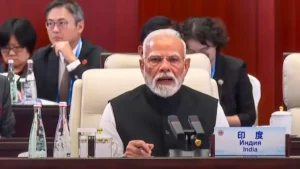Chinese money is pouring into British universities
S TUDENTS ATTENDING Liverpool University can study at an affiliated campus near Shanghai. Manchester University boasts research links to nine Chinese universities and hosts Britain’s second Confucius Institute, a language school and cultural centre funded by the Chinese government. At least 15% of the student bodies at both universities—and at Glasgow and Sheffield, also members of the elite Russell Group—are students from China.
Listen to this story. Enjoy more audio and podcasts on iOS or Android Your browser does not support the
In recent years Britain has gone all-in on Chinese students. More than 140,000 are enrolled in undergraduate or postgraduate courses, up 50% from five years ago. They account for a third of non- EU international students across all universities, and around £2.5bn ($3.3bn) of the £7bn in tuition fees that such students pay each year. That is about 6% of universities’ total income. And Britain has managed to hold onto its foreign students during the covid-19 pandemic, with lower declines in first-year international enrolments than seen in either America or Australia.
This source of income has become increasingly important for British universities. They rely on foreign students’ fees, which are far higher than those for home students, to subsidise everything else they do. Government spending per university student has flatlined in recent years, and last month the Department for Education announced that home students’ tuition fees would be frozen for the next two years. A report in 2021 written jointly by King’s College London and Harvard University estimated that, in 2018, education exports were worth about £23.3bn to Britain, two-thirds of which was accounted for by higher education. For comparison, financial services were worth £20bn.
Paying the piper
In 2015, under David Cameron, the Conservatives declared a “golden decade” of Sino-British relations. Britain would become the Western country most open to Chinese investment. But as China under Xi Jinping has become increasingly authoritarian, they have started to worry that Chinese students and cash could come at the cost of free speech on campuses.
Academics say tentacles of the Chinese state that reach into Britain try to choke off discussion of sensitive topics such as Tiananmen, Tibet and Taiwan. Some Confucius centres have broadened their mandate from cultural activities to take in protecting China’s reputation abroad. In 2019 academics at Nottingham University, which has a Confucius Institute and a campus near Shanghai, cancelled a speaker from Taiwan, reportedly after complaints from Chinese officials. (The university denied there was any connection.) The Chinese Students and Scholars Association, which is backed by the Chinese state and is intended to help new arrivals in Britain settle in, has also interfered with speech on campus. In 2017 it organised students at Durham University to barricade a building in an attempt to stop an event featuring a speaker who practises Falun Gong, a spiritual movement banned in China.
Classroom discussions are suffering, too. Last year Human Rights Watch, an international NGO , said Chinese students in Australian universities, which are even more dependent on their fees, reported self-censoring for fear that Chinese peers would report them to the government back home. In a survey in 2020 of social scientists by researchers at the universities of Exeter, Oxford and Portsmouth, two-fifths of those specialising in China said they had self-censored when teaching students from authoritarian regimes. Oxford has arranged anonymity for students turning in papers on sensitive topics related to China.
Some academics hesitate to push back for fear of losing research funding or opportunities. In 2000 papers co-authored with Chinese academics accounted for 1% of all those with a British author. By 2019 that share had increased to 11%.
For university administrators, the bigger fear is that China will turn off the student pipeline. After a row about whether Chris Patten, Oxford’s chancellor and Hong Kong’s final governor under British rule, could visit Hong Kong, the university was reportedly given to understand that its status as a destination for Chinese students was at risk. Its vice-chancellor, Louise Richardson, retorted that students from India would eagerly take their place.
The British government and higher-education associations have offered guidance to keep universities and professors from striking agreements that would allow sensitive research to fall into foreign governments’ hands. (A report in 2021 by Civitas, a right-leaning think-tank, found that half of Russell Group universities had current or previous research agreements or partnerships with companies linked to the Chinese armed forces.) Since January the British government has had the power to scrutinise contracts, including those signed by universities, that involve sharing intellectual property with foreigners.
In an attempt to increase transparency Jesse Norman, a Conservative MP , has proposed requiring universities to report foreign contracts of more than £50,000 to the Office for Students, the higher-education regulator. America has a similar rule. But the proposal may go nowhere: it is part of a bill that has been awaiting report stage since September and is unlikely to be heard in this parliamentary term.
In any case, such a measure could overwhelm the Office for Students with irrelevant data, such as international students’ tuition and living expenses. It could also fail to provide meaningful information about the true sources of funding if universities themselves are misled or confused. In 2012 the University of Cambridge announced that a new chair in Chinese development had been endowed by a China-based foundation with no ties to the government. Two years later, the foundation was found to be run by the daughter of a former prime minister.
Calling the tune
Nor would greater transparency about funding do anything to tackle the main cause of British universities’ financial dependence on China: student numbers. The King’s College and Harvard University report cautioned against imposing limits on foreign or Chinese students, a plurality of whom study business and management and have no interest in thwarting free speech. The government’s international-education strategy advises universities to recruit students from many countries to avoid becoming overly reliant on one.
For some, that advice came a little late. India, the country that sends the second-largest number of students to Britain—85,000 this year—accounts for a fraction of Chinese numbers. Chinese influence is manageable on campuses as long as administrators and academics stand up for academic independence, says Steve Tsang of the China Institute at the School of Oriental and African Studies in London. But for universities that lack Oxford’s deep pockets and global prestige, firmness may already have become too risky. ■









